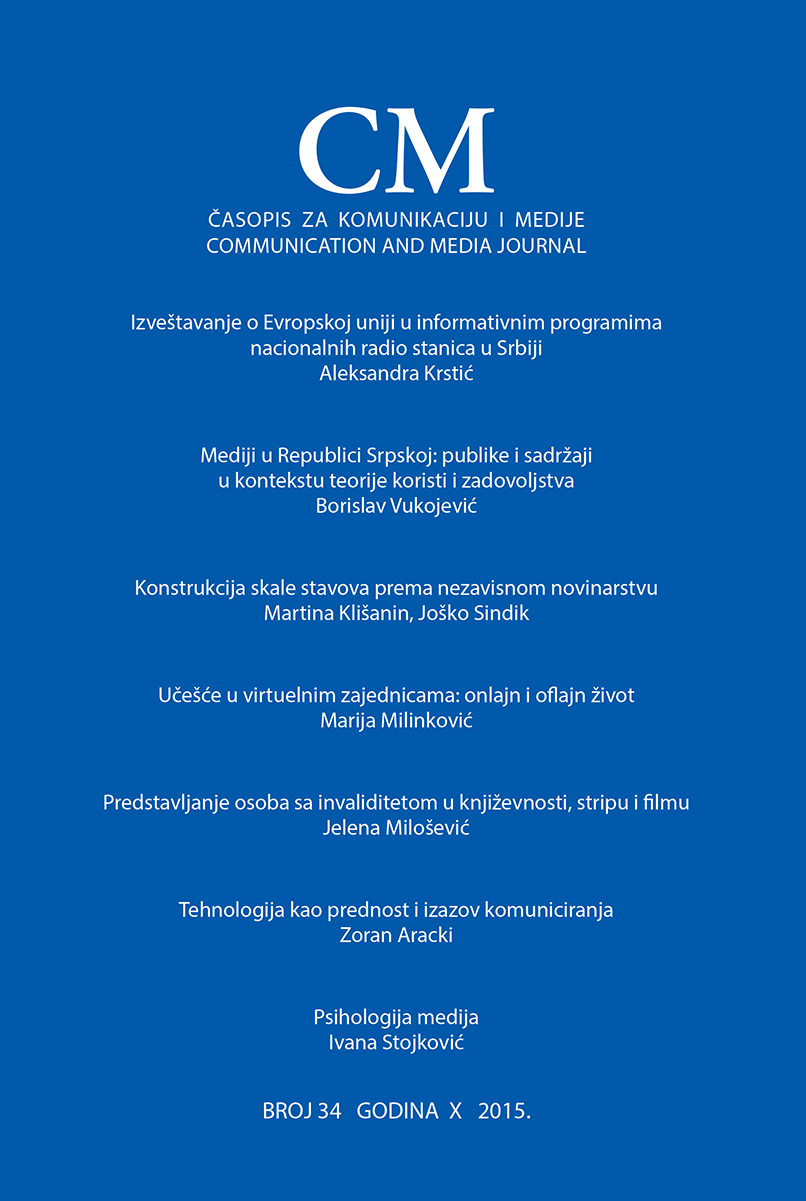Participation in virtual communities: online and offline life
Abstract
The purpose of the research is to establish the consequences of participation in virtual communities on the life in the physical world among electronically literate individuals. In the paper, possibilities and threats of one’s presence in online communities are presented, and observed from a sociological and psychological perspective of influence on the life in a group and individual changes.
Data collection techniques conducted for the research include online questionnaire with scales of assessment aimed for measuring the intensity of attitudes and behavior on a selected sample of 100 respondents, 20 semi-structured in-depth interviews on a stratified random sample of primary and secondary school children, as well as systematic observation of image creation through the photos on virtual profiles on the sample of 238 members of Facebook.
Internet made possible for everyone to become a public figure, and with that, the image that we send to others became a better version of us. The results of the research confirmed the hypothesis that life in virtual communities is equally realistic and sometimes stronger than events in the physical world. Hypotheses that are also confirmed relate to the feeling of frustration and competition on social networks, change of identity and behavior on the network. The hypothesis which claims that the youth spend more time in virtual communities, rather than in traditional ones is not confirmed in this study. The conclusion derived from comparisons of the author’s and existing research in the field of virtual communities points to the necessity of education and assistance from the education system, in odrer to prepare new generations not only for the technological understanding of virtual live, but also for recognition of its influence on offline life.
References
Bodroža, B., Jovanović, S., Popov, B. (2008). Latentna struktura ponašanja u virtuelnim
Bubonjić, M. (2013). Odrastanje u digitalnom dobu, Časopis za upravljanje komuniciranjem, br. 27, str. 179-184.
VIP, Ipsos, GFK i onSpot (2014). Kako mladi u Srbiji koriste mobilne uređaje, posećeno 28.11.2014. URL: http://www.vipmobile.rs/upload/documents/Infografika.pdf
Ipsos Media (2012). Praćenje korišćenja novih medija, posećeno 1.12.2014, URL: http://www.mc.rs/upload/documents/saopstenja_izvestaji/2012/120712_IPSOS-koriscenje-novih-medija.pdf
Kahne, J., Westheimer, J., Hope King, S. (1996). Visions of Community and Education in a Diverse Society, posećeno 27.11.2014, URL: http://hepg.org/her-home/issues/harvard-educational-review-volume-66-issue-4/herarticle/_248
Kotarska, I., Marković, E., Minić, J. (2011). Emocionalna inteligencija kao činilac uticaja sajberprostora na međuljudsku komunikaciju, TEME - časopis za društvene nauke , br. 4, str. 1657-1675.
Kupainen, R. (2013). Young people’s creative online practices in the context of school community, posećeno 24.12.2014. URL: http://www.cyberpsychology.eu/view.php?cisloclanku=2013011605&article=8
Petkovska, S. (2010). Drugi život kao tehnološki narativ (dandellion/@ kimban: jedna priča o jednom virtuelnom svetu), Sociologija, Vol. LII (2010), N° 2, str.13.
Petrović, D. (2009). Internet u funkciji personalnog umrežavanja, Sociologija, 1/2009, 02, str. 24-42.
Radojičić, M. (2008). Istraživanje virtuelnih zajednica i javnog mnjenja na Internetu, Beograd, Službeni glasnik
Republički zavod za statistiku (2014). Upotreba informaciono –komunikacionih tehnologija u RS, posećeno 28.12.2014. URL: http://webrzs.stat.gov.rs/WebSite/repository/documents/00/01/50/47/Saopstenje_2014.pdf
Rot, N. (2002). Osnovi socijalne psihologije, Beograd, Zavod za udžbenike
Sibak, A. (2007). Reflections of RL in The Virtual World, posećeno 8.12.2014, URL: http://www.cyberpsychology.eu/view.php?cisloclanku=2007072301&article=7
Simović, V. (2010). Socijalni i pravni kontekst računarstva, Beograd, Visoka škola strukovnih studija za informacione tehnologije
Stamenković, D., Vlajković, I. (2004). Jezički identitet u komunikaciji na društvenim mrežama u Srbiji, Niš, Filozofski fakultet
Stanković, B. (2011). Stalni strah od bliskosti - Intervju sa Šeri Terkl, posećeno 20.02.2015, URL: http://www.politika.rs/rubrike/Kultura/Stalni-strah-od-bliskosti.lt.html
Stojković, B. (2002). Identitet i komunikacija, Beograd, Fakultet političkih nauka u Beogradu, Čigoja štampa
Terkl, Š. (2011). Sami zajedno, Beograd, Clio
Filder, R. (2004). Mediamorphosis, Beograd, Clio
Hrabri telefon i Poliklinika za zaštitu dece grada Zagreba, Istraživanje o iskustvima i ponašanjima djece na Internetu i na društvenoj mreži Facebook, posećeno 18.12.2014, URL: http://www.poliklinika-djeca.hr/istrazivanja/istrazivanje-o-iskustvima-i-ponasanjima-djece-na-internetu-i-na-drustvenoj-mrezi-facebook-2/
Čupić, Č. (2002). Sociologija struktura-kultura-vladavina, Beograd, Fakultet političkih nauka
Džouns, S. (2001). Virtuelna kultura – Identitet i komunikacija u kiber društvu, Beograd, Biblioteka XX vek
Štambuk, V. (2010). Communico ergo sum ili Internet kako je nastao i kuda smera, Beograd, Akademska misao
Copyright
Authors retain copyright of the published papers and grant to the publisher the non-exclusive right to publish the article, to be cited as its original publisher in case of reuse, and to distribute it in all forms and media.
Licensing
The published articles will be distributed under the Creative Commons Attribution ShareAlike 4.0 International license (CC BY-SA). It is allowed to copy and redistribute the material in any medium or format, and remix, transform, and build upon it for any purpose, even commercially, as long as appropriate credit is given to the original author(s), a link to the license is provided, it is indicated if changes were made and the new work is distributed under the same license as the original.
Users are required to provide full bibliographic description of the original publication (authors, article title, journal title, volume, issue, pages), as well as its DOI code. In electronic publishing, users are also required to link the content with both the original article published in CM: Communication and Media and the licence used.
Authors are able to enter into separate, additional contractual arrangements for the non-exclusive distribution of the journal's published version of the work (e.g., post it to an institutional repository or publish it in a book), with an acknowledgement of its initial publication in this journal.
Self-archiving policy
Authors are permitted to deposit author’s publisher's version (PDF) of their work in an institutional repository, subject-based repository, author's personal website (including social networking sites, such as ResearchGate, Academia.edu, etc.), at any time after publication.
Full bibliographic information (authors, article title, journal title, volume, issue, pages) about the original publication must be provided and links must be made to the article's DOI and the license.
Disclaimer
The views expressed in the published works do not express the views of the Editors and the Editorial Staff. The authors take legal and moral responsibility for the ideas expressed in the articles. Publisher shall have no liability in the event of issuance of any claims for damages. The Publisher will not be held legally responsible should there be any claims for compensation.

